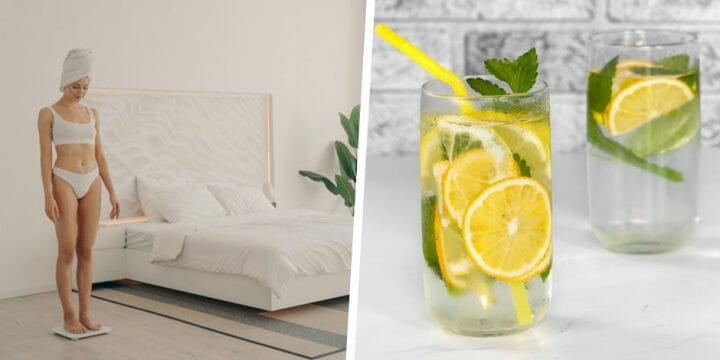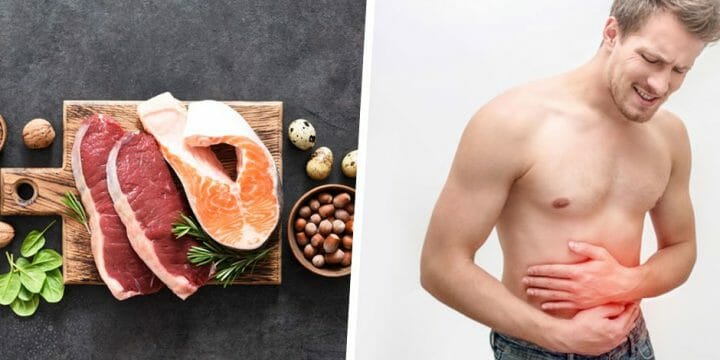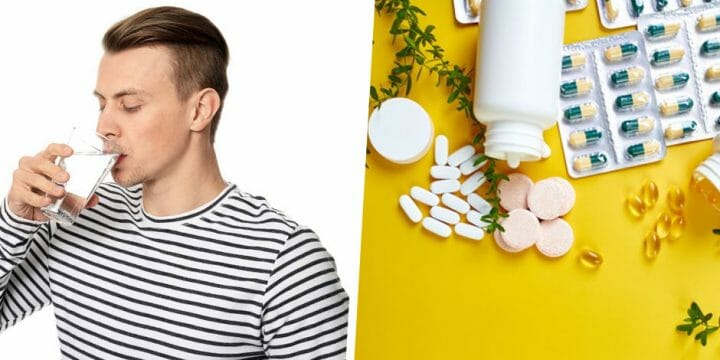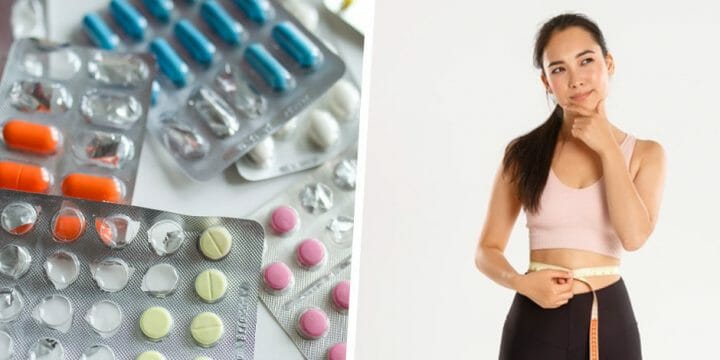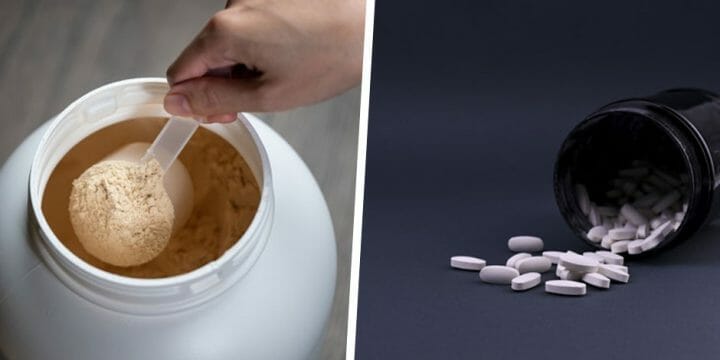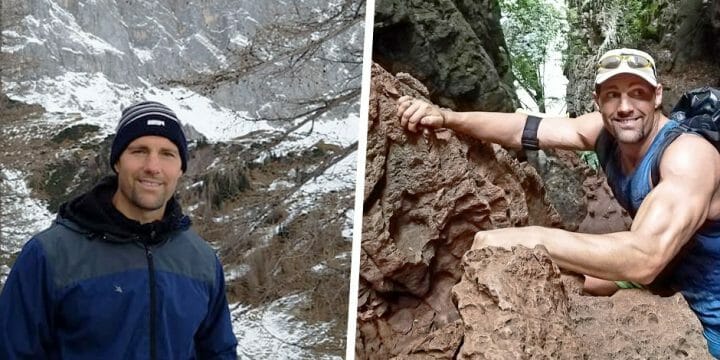In my experience as a nutritionist, I've observed numerous individuals adopting keto diets.
A critical aspect often overlooked is the necessity of increased water intake on such low-carb diets. Lack of adequate hydration can cause serious side effects.
To address this, I've invested considerable time in studying the appropriate water consumption for those on a keto diet.
Keep in mind that keto-induced weight loss may lead to loose skin. To keep your body tight, consider using these keto-friendly protein powders. They can help you reclaim your muscles and look your best.
Quick Summary
- To support metabolic health on a keto diet, it's recommended to drink at least 2.5 liters of water daily, adjusting based on individual body weight.
- A practical formula for hydration on keto is to drink 75% of your body weight in ounces of water per day.
- A person weighing 180 pounds requires around 135 ounces of water per day on a keto diet, significantly more than the general recommendation.
- In my opinion, understanding and adapting to your unique hydration needs is crucial for success and health on a keto diet.
How Much Water Should You Drink On Keto?

The short answer is that you’ll need to drink more water than usual while on a keto diet. But you may be wondering what that means in practice. One expert shares a general rule of thumb that you can follow :
“At the beginning of your keto diet], you should drink at least 2.5 liters of water or fluid per day to replace the amount lost in urine. Once you become keto-adapted, you should still consume a minimum of two liters of water daily in order to prevent dehydration and promote optimal metabolic health.”
- Franziska Spritzler, RD, Certified Diabetes Educator
So, you could try to drink 2.5 liters (~85 ounces) of water per day. But you could also establish your individual hydration needs on a ketogenic diet based on your body weight. That could be a better option than following a hard and fast rule that might be too general.
Calculating Your Ideal Water Intake
Use the following formula to calculate your ideal intake of water:
Your bodyweight x 75% = Ounces of water per day
Here are a couple of examples to illustrate how to use this formula to calculate your hydration needs:
- If you weigh 120 pounds, you’ll need 90 ounces of water per day (120 x 0.75 = 90)
- If you weigh 180 pounds, you’ll need 135 ounces of water per day (180 x 0.75 = 135)
Clearly, a 180-pound person on keto needs way more water than the old rule of thumb suggests. That's why I'm all for the formula instead. Once you've got your hydration number, the real challenge is sticking to it. But don't sweat it—I've got some tips to help you stay hydrated.
Now, let's dive into why keto ups your need for water.
Why Does My Body Need More Water On Keto?
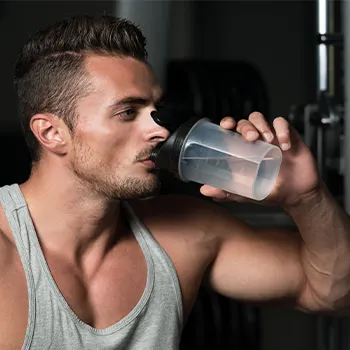
To manage water weight on the keto diet, it is important to stay hydrated and maintain adequate fluid intake while also paying attention to fat and fatty acids consumption as well as electrolyte intake.
In a nutshell, your body needs more water on keto because it loses water during ketosis.
Carbohydrates and Insulin in Ketosis
Eating a keto diet means you’re keeping your carbohydrate intake low.
Low carb intake decreases levels of the hormone insulin. And, according to the National Institute of Health (NIH), low insulin encourages your body to start burning fat, i.e., enter ketosis [1].
Since keto is a low-carb, high-fat diet, your body will use fat instead of carbs for energy, but not entirely. It will also start using the glycogen stored in your body for this purpose.
Importance of Hydration in Keto Diet
To support the body weight and overall health, it is crucial for keto dieters to stay adequately hydrated by consuming plain water, green tea, and other healthy fluids while ensuring proper intake of essential electrolytes.
Since the keto diet involves low carbohydrate intake and promotes low insulin levels, maintaining healthy blood volume and staying hydrated becomes even more important as the body transitions into a state of ketosis.
Electrolytes
From my experience as a nutritionist, I've noticed how keto zaps those unused carbs, glycogen, leading to weight loss.
Here's the deal: when glycogen goes, so does water. Each gram of glycogen holds onto 3-4 grams of water, so there goes your water weight. There's more. You're not just losing water. Key electrolytes, sodium and potassium, vital for fluid balance, also take a nosedive.
So, I always recommend upping your water intake on keto. Skip this, and you're dancing with dehydration.
Symptoms And Prevention Of Dehydration

The first step in preventing dehydration is knowing how to recognize it.
These are the symptoms of mild dehydration according to WebMed [2]:
- Thirst
- Dry, sticky mouth
- Dark, yellow pee
- Dry skin
- Headaches
- Muscle cramps
Below are the symptoms of severe dehydration:
- Dizziness
- Rapid heartbeat
- Rapid breathing
- Sunken eyes
- Nausea
- Fatigue
I've seen plenty of cases where keto symptoms look a lot like the flu. Yep, that's the keto flu, a common experience for those on the diet.
What's behind it? It's not crystal clear, but dehydration often plays a big role. That's why I always recommend drinking plenty of water as a first line of defense.
But, here's the twist: tackling dehydration isn't only about drinking water. There's a bit more to it.
Step #1: Change Your Mindset
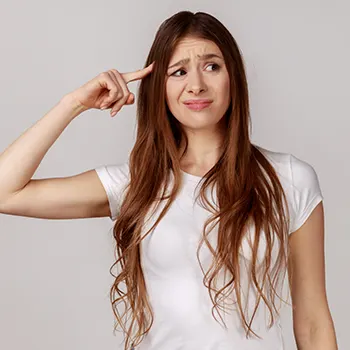
Time to ditch the 8x8 water rule – it's not backed by solid science. This myth kicked off with the Food and Nutrition Board's vague suggestion for men to drink about 2,500 ml daily, but without hard evidence.
Instead, try the 75%-formula for a more precise water intake on a low-carb diet. It beats the old 8x8 hands down.
Step #2: Make A Habit Out Of Drinking Water
You can do so by setting your alarm to go off every half an hour or by keeping a water bottle near you at all times. Both strategies will help you hydrate on auto-pilot.
First, you’ll be reminded to take regular sips of water. After a while, you won’t need reminders anymore.
Downsides Of Overhydration

Our main concern with low-carb diets is dehydration. However, you can still overhydrate even if you’re on a ketogenic diet.
Overhydration isn’t good either. Drinking too much water can lead to a state called hyponatremia, which, according to Mayo Clinic, occurs when your blood sodium levels are too low [3].
Low sodium levels are common with folks on a keto diet for two reasons:
- A ketogenic diet implies that we’re cutting out processed foods and salty carbs (i.e., consuming less sodium than usual).
- We lose more sodium through urine in ketosis.
So, the problem is that you already don’t have enough sodium while on keto.
Drinking only sodium-free water or simply too much water will further dilute your sodium levels and cause symptoms of hyponatremia, such as:
- Muscle weakness, spasms, and cramps
- Fatigue
- Nausea
- Irritability
- Headaches
- Seizures
- Coma
Avoiding Hyponatremia
Luckily, there are things you can do to prevent hyponatremia even while on a low-carb diet.
For one, you can watch your sodium consumption. Try eating more healthy sodium-rich foods, such as buttermilk, cottage cheese, or canned vegetables.
Of course, you don’t want to overdo it with sodium-rich foods since you’re still trying to lose weight. And too much sodium may prevent weight loss and beat the purpose of a keto diet.
Other Ways To Hydrate On A Keto Diet

As a nutritionist, I can tell you that hydration isn't just about how much water you drink. There are other key steps to take. Let's dive into the top three.
- Munch on water-rich foods: Keto diets often cut out fruits and veggies, which are full of water. Skipping these can dry you out. So, swap out those "no-no" foods with keto-friendly, water-packed options. Think broccoli instead of peas, and berries over bananas.
- Ease up on the caffeine: It was a common belief that caffeine led to dehydration, but, according to WebMed, moderate coffee consumption is generally side-effect free [4]. However, caffeine does make you pee more. On a keto diet, this could mean losing more water. So, maybe cut down on the caffeine. Check out our top keto-friendly pre-workouts for ideas.
- Go for rehydration drinks: These aren't just for post-workout. Pick keto-friendly options with minimal carbs. Otherwise, it's all for naught. Use them to stay hydrated on your keto journey.
Ketogenic Supplements and Hydration
Certain ketogenic supplements, such as exogenous ketones and medium-chain triglyceride (MCT) oils, may impact hydration levels.
- Exogenous ketones, often in the form of salts, may lead to increased urine output, potentially affecting fluid balance and necessitating higher water intake to prevent dehydration.
- On the other hand, MCT oils might induce a mild diuretic effect, potentially influencing hydration status.
Adequate water consumption becomes crucial when incorporating these supplements, as they can contribute to fluid loss.
FAQs
Can Not Drinking Enough Water on Keto Stall Weight Loss?
Yes, not drinking enough water on keto can stall weight loss. But that’s true for any type of diet since dehydration slows down your metabolism and triggers food cravings.
Can Drinking a Lot of Water Lower Ketones?
Yes, drinking a lot of water lowers ketones. Drinking water increases urine production, which aids in the removal of numerous ketones from the body.
References:
- https://www.ncbi.nlm.nih.gov/pmc/articles/PMC6472268/
- https://www.webmd.com/a-to-z-guides/dehydration-adults
- https://www.mayoclinic.org/diseases-conditions/hyponatremia/symptoms-causes/syc-20373711
- https://www.webmd.com/vitamins/ai/ingredientmono-980/coffee
About The Author
You May Also Like
